The NIH Clinical Center is the world's largest hospital entirely devoted to clinical research. It is a national resource that makes it possible to rapidly translate scientific observations and laboratory discoveries into new approaches for diagnosing, treating, and preventing disease.
Clinical research is at the heart of the Clinical Center's mission.
Over 1,600 clinical research studies are conducted at the NIH Clinical Center, including those focused on cancer, infectious diseases, blood disorders, heart disease, lung disease, alcoholism and drug abuse. Most of these studies are sponsored by the Institutes and Centers at NIH.
Here is a sample of abstracts from the clinical research conducted at the NIH Clinical Center and published in a peer reviewed medical journal this year. Links to the full text and video formats are provided if available.
2024

Plasma Glycated Albumin in Early Pregnancy and Gestational Diabetes Mellitus: A Prospective and Longitudinal Study
Published in: Diabetes Care (July 2024)
New research suggests pregnant women with higher concentrations of an indicator of diabetes known as glycated albumin (GA) tended to have a lower risk for gestational diabetes mellitus (GDM), a condition associated with complications for mother and offspring. The study suggests GA concentrations in mid-pregnancy might be lower in women who later develop GDM.
Read the article
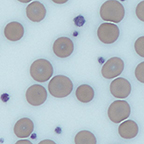
Cumulative Donor-Specific Antibody Threshold Predicts Platelet Transfusion Response in HLA-Alloimmunized Patients
Published in: Blood Advances (July 2024)
Up to a third of blood cancer patients who receive multiple blood transfusions have repeated suboptimal responses to platelet transfusions for immune-mediated reasons. In a large retrospective study, researchers reviewed 2,012 platelet transfusions among 73 patients who developed antibodies to donated blood cells (HLAs) to evaluate factors influencing effective platelet transfusion. The team also developed an algorithm to optimize donor-recipient cell compatibility and sought predictors of platelet transfusion effectiveness.
Read the article

CD34+ Cell Yield Among Healthy Donors: Large-scale Model Development and Validation
Published in: Journal of Clinical Apheresis (June 2024)
In a new study, scientists introduce advanced predictive models for estimating CD34+ cell yield from apheresis blood donations, with one particular model demonstrating remarkable accuracy and practical utility. Key to stem cell transplantation for blood cell production, CD34+ cells are multipotent stem cells able to produce a variety of blood cell types.
Read the article

40 Years of Researching Del Phenotypes Results in a Change of Transfusion Practice
Published in: Transfusion (June 2024)
Conventional blood tests fail to detect D antigen, a red blood cell surface protein, in individuals with East Asian ancestry and a gene-based characteristic known as Del phenotype. Authors of a new review say recent clinical evidence strongly suggests that Asian-type DEL individuals can safely be transfused with RhD-positive blood and do not need anti-D prophylaxis in pregnancy.
Read the article

Ethics and Highly Innovative Research on Brain Diseases
Published in: The New England Journal of Medicine (June 2024)
The burden of brain disorders makes brain research critical. However, given the brain’s role in important human functions, ethics is inextricably interwoven in research priority-setting, conduct, and implementation. For example, who is responsible for post clinical trial care of patients with brain implants?
Read the article
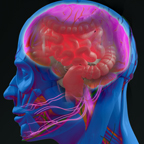
The Gut-Brain Axis in Individuals with Alcohol Use Disorder: An Exploratory Study of Associations among Clinical Symptoms, Brain Morphometry, and the Gut Microbiome
Published in: Alcohol Clinical and Experimental Research (June 2024)
Alcohol use disorder (AUD) is a complex disorder and is commonly associated with distressing psychological symptoms. Researchers studied 16 patients with AUD at the NIH Clinical Center and evaluated their gut microbiome samples and MRI images during a four-week inpatient treatment period. This study identified gut microbiome features associated with regional brain characteristics and AUD-associated symptom severity.
Read the article
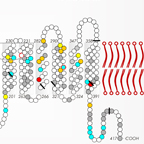
DNA Reference Reagents for Genotyping RH Variants
Published in: Journal of Molecular Diagnostics (June 2024)
Patients who carry red blood cell surface proteins known as Rhesus (RH) blood group variants may develop antibody responses after blood transfusions if not properly matched. In an international collaborative study led by the FDA and NIH, scientist say they have validated eight DNA reagents for use as reference standards for developing assays and analytical validation of Rh blood group genotyping.
Read the article
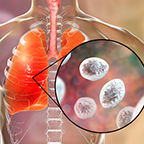
Retracing the Evolution of Pneumocystis Species, with a Focus on the Human Pathogen Pneumocystis Jirovecii
Published in: Microbiology and Molecular Reviews (April 2024)
Researchers reviewed the evolution of P. jirovecii, a fungus presumed to infect every person at least once in their lifetime and the cause of life-threatening Pneumocystis pneumonia in immunosuppressed hosts. Pneumocystis have evolved mechanisms to evade host immune responses and to utilize unique surface proteins for successful infection of humans.
Read the article
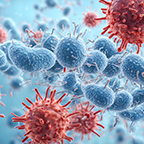
Assessing Clinician Utilization of Next-Generation Antibiotics Against Resistant Gram-Negative Infections in U.S. Hospitals: A Retrospective Cohort Study
Published in: Annals of Internal Medicine (April 2024)
Researchers examined doctors’ preference for newer antibiotics over traditional generic agents to shed light on the decision-making processes among clinicians when treating patients with bloodstream infections caused by gram-negative bacteria and significant comorbidities. The study revealed that a considerable number of hospitals were reluctant to adopt newer antibiotics.
Read the article

A Novel CARMIL2 Immunodeficiency Identified in a Subset of Cavalier King Charles Spaniels with Pneumocystis and Bordetella Pneumonia
Published in: The Journal of Fungi (March 2024)
Certain dog breeds, such as the Cavalier King Charles Spaniel, are over-represented for Pneumocystis pneumonia, suggesting the presence of a primary immunodeficiency in the breed. Dogs are a natural animal model for studying relationships between immunodeficiencies and susceptibility to respiratory pathogens.
Read the article

Patients with red cell antibodies: registries improve patient care by increasing patient safety, reducing costs, and enabling health information exchange
Published in: Blood Transfusion (March 2024)
Some countries have voluntary registries for patients with red cell antibodies, but most lack comprehensive national databases. These registries, essential for managing rare antigen antibodies, have evolved to serve broader patient needs. They save time and costs by providing ready access to patients' antibody histories, aiding in efficient transfusion management.
Read the article
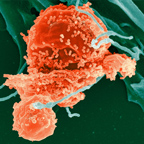
CD40 Expression by B cells is Required for Optimal Immunity to Murine Pneumocystis Infection
Published in: Journal of Infectious Diseases (March 2024)
Pneumocystis jirovecii is a serious infection affecting immunocompromised individuals. CD40-CD40L interactions are critical for controlling a Pneumocystis infection. Scientists used a mouse model to demonstrate that expression of CD40 by B cells was critical to generating an effective immune response against Pneumocystis infection.
Read the article

Assessing Acceptability: The Role of Understanding Participant, Neighborhood, and Community Contextual Factors in Designing a Community-Tailored Cooking Intervention
Published in: Nutrients (February 2024)
The study investigates the low prevalence of healthy diets among African American adults with cardiovascular disease risk factors in low food access areas. The study underscores the importance of culturally sensitive and community-driven approaches to improve dietary habits and reduce health disparities.
Read the article.
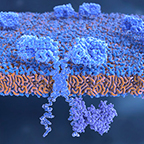
Expanding the reach of commercial cell therapies requires changes at medical centers.
Published in: Journal of Translational Medicine (February 2024)
Once restricted to academic medical centers, cell therapies are increasingly used to treat cancer, immune deficiencies and other diseases. In a commentary, researchers suggest ways to address the many logistical challenges and necessary standards of practice to improve access to these therapies at community medical centers.
Read the article.

Trends in Patient Transfers from overall and Caseload-Strained US Hospitals During the COBID-19 Pandemic
Published in: JAMA Network (February 2024)
This study investigates whether hospitals were able to increase patient transfers when they experienced overcrowding during the COVID-19 pandemic. During the pandemic, there was a decrease in overall patient movement and an inability to increase transfers in overcrowded rural hospitals. The study points to vulnerabilities in patient safety and access to hospital care with implications for the future.
Read the article.

Catastrophic Sports Injuries: Causation and Prevention
Published in: Journal of Bone and Joint Surgery (January 2024)
New research suggests catastrophic sports injuries caused by direct contact have declined over the past 40 years, thanks to effective rule changes in high-risk sports. However, nontraumatic catastrophic sports injuries have increased and require cost-effective tools to screen for heart conditions and sickle cell traits, among other interventions.
Read the article.
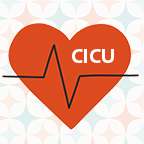
Training Paradigms in Critical Care Cardiology: A Scoping Review of Current Literature
Published in: JACC: Advances (January 2024)
This study explores the evolving landscape of critical care cardiology (CCC) training, noting an unmet need to further integrate critical care medicine training into cardiovascular fellowship programs. To accomplish this and advance patient care in the cardiac intensive care unit (CICU) environment, the authors discuss the need for developing standardized CCC competencies based on CICU levels of complexity and the needs of their patient populations.
Read the article.
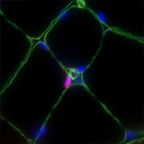
Ultrasound Pressure-Dependent Cytokine and Immune Cell Response Lost in Aged Muscle
Published in: Ultrasound in Medicine and Biology (January 2024)
Ultrasound is a noninvasive procedure currently used to treat damaged muscle tissue. Researchers treated mice with low- or high-intensity therapeutic ultrasound to understand the subsequent immune response. Based on age, ultrasound has the potential to be used to achieve distinct goals within different populations.
Read the article.
Read more articles about research in the NIH Clinical Center in 2024.
